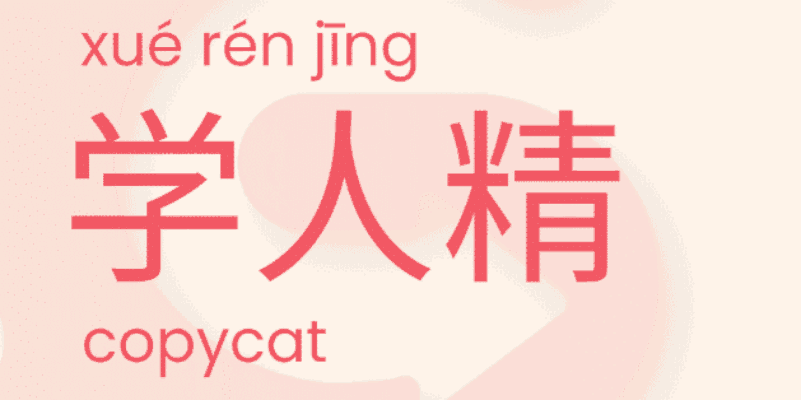How to Say Copycat in Chinese
How to Say Copycat in Chinese?
学人精 (xué rén jīng) is how you say “copycat” in Chinese. This modern slang term literally means “person who studies others’ ways” and perfectly describes someone who copies everything without originality.
Quick Answer Summary
Chinese Term: 学人精 (xué rén jīng)
Literal Meaning: Person who studies others’ ways
Usage: Describes serial mimics and copycats (mildly critical tone)
Ever noticed someone copying your every move on social media? Your photos, your captions, even your style choices? This Chinese slang captures exactly what English speakers mean by “copycat” — but with a uniquely Chinese twist that makes it even more expressive.
What Does 学人精 (Xué Rén Jīng) Mean?
学人精 breaks down into three parts:
- 学 (xué) = to learn or study
- 人 (rén) = person
- 精 (jīng) = spirit or essence
Together, they literally mean “person who studies others’ ways.” But in everyday Chinese conversation, this term describes someone who copies everything without any original thought.
Think of that friend who always posts the same type of content right after you do, or the coworker who mimics your presentation style. That’s a 学人精.
How to Pronounce 学人精
The pronunciation is: xué rén jīng
- xué sounds like “shway”
- rén sounds like “ren” (as in “wren”)
- jīng sounds like “jing” (rhymes with “ring”)
Using 学人精 in Real Conversations
Here are practical examples you can use today:
Example 1: 她发的内容又在学我,真是个学人精。 Tā fā de nèiróng yòu zài xué wǒ, zhēn shì gè xuérénjīng. “She’s copying my content again — such a copycat!”
Example 2: 不要当学人精,要有自己的想法。 Bù yào dāng xuérénjīng, yào yǒu zìjǐ de xiǎngfǎ. “Don’t be a copycat — have your own ideas.”
Example 3: 他总是学人精,从来没有原创的东西。 Tā zǒng shì xuérénjīng, cóng lái méi yǒu yuánchuàng de dōngxi. “He’s always copying others and never has anything original.”
Other Ways to Say Copycat in Chinese
While 学人精 is the most popular modern slang, Chinese offers several alternatives:
- 模仿者 (mó fǎng zhě) = imitator (more formal)
- 抄袭者 (chāo xí zhě) = plagiarizer (stronger, more serious)
- 跟风的人 (gēn fēng de rén) = someone who follows trends blindly
Why 学人精 Is Perfect for Social Media Age
This slang term became popular because it perfectly captures modern digital behavior. Unlike older Chinese words for copying, 学人精 has a playful yet critical tone that fits perfectly when calling out copycats on social platforms.
The term suggests someone who studies others so intensely that they lose their own identity — which feels very relevant in our Instagram and TikTok world.
Cultural Context: When to Use This Term
Use 学人精 in casual conversations with friends or when posting on social media. It’s not appropriate for formal situations or professional settings.
The tone is mildly critical but not harsh — it’s more like gentle teasing than serious accusation. Perfect for when you want to point out copying behavior without being too mean about it.
Practice Using 学人精
Start incorporating this term into your Chinese conversations. Next time you notice someone copying trends or mimicking others, you’ll have the perfect word to describe it.
Remember, mastering slang like 学人精 helps you sound more natural and connected to how Chinese people actually speak today.
Frequently Asked Questions
What does 学人精 mean in Chinese?
学人精 (xué rén jīng) means “copycat” in Chinese. It describes someone who copies others’ behavior, style, or ideas without originality.
How do you pronounce 学人精?
学人精 is pronounced “xué rén jīng” – sounds like “shway-ren-jing” with the tones: rising, level, rising.
Is 学人精 offensive in Chinese?
学人精 is mildly critical but not harsh. It’s more like gentle teasing than a serious insult – perfect for casual conversations about copycat behavior.
Can I use 学人精 in formal situations?
No, 学人精 is casual slang best used with friends or on social media. Avoid it in professional or formal settings.
What are other ways to say copycat in Chinese?
Other options include 模仿者 (mó fǎng zhě) for “imitator” (more formal) and 抄袭者 (chāo xí zhě) for “plagiarizer” (stronger meaning).
Want to learn more Chinese slang and everyday expressions? Check out our original Instagram post for more examples, and discover how GoEast Mandarin can help you master real, conversational Chinese that native speakers actually use.


